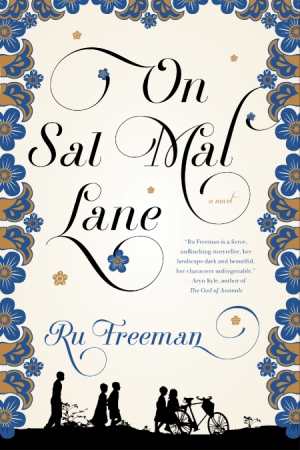Kindred Spirits
Serendipity

Ru Freeman’s novel about war, On Sal Mal Lane, will be published in May by Graywolf Press. The author calls both Sri Lanka and America home.
Does the past make any more sense to you for having recorded it?
It is impossible to understand our present or to build a future so long as the past remains unacknowledged. What makes sense to me is that I have set down the details of that time, rife as it was with unknowing and suspicion and bravado and shameless politicking, as well as immense goodwill and love. It is a messy picture, but it is a more complete canvas than the one we inhabit when we choose a side.
Do you have a method for fictionalizing politics?
The best way to deal with politics is to look at what it does to ordinary people, for that is all that matters. What did American slavery do to “Missy,” sold with her three children to a Mr. Agee for $2,700? We imagine her husband, glad to have his wife and kids bought by the man who owns him, raising a cry to God in gratitude. What does it mean to feel grateful for such a travesty? Likewise, what might it feel like to watch a bedridden man carried from his house before it burns? It is only when we focus on the minutiae of ordinary lives that we understand the absurdity of policies hollered about in government buildings.
Please talk about surveillance as a theme in your book.
People observe each other constantly on Sal Mal Lane, but each person’s “truths” are based on their own beliefs about the others and about themselves, and a lot of the time, therefore, they are wrong. In many ways, this myopia that afflicts each of the people down the lane at one time or another reflects the national “sightlessness” that dictated the reaction and counterreaction to political events.
What’s important for us to know about Sri Lanka now?
It is impossible to visit Sri Lanka and not fall in love. There is a reason why the term “serendipity” (coined by Horace Walpole), has its origins in “Serendip” the name given to the island by Arab traders in 361 AD. There is also a reason why just a few months after the war ended, the New York Times named it as the top travel destination in the world, this island that contains rain forests and a dry zone, plains, mountains, waterfalls, pristine beaches—a beautiful place that went through decades of war and a tsunami.
There has been a concentrated effort to restore a sense of openness to physical space in Sri Lanka; to erase the memory of fear, the road blocks, the military in the streets. When I think of the shaky steps being taken toward reconciliation I have an image of someone kept in a dungeon for most of their life emerging into sunlight and sound. It will take a lot of time and patience to coax that human being to let down their guard, to resist the urge to shut their eyes against the light, to reach out and touch another. The nation as a whole is rebuilding, thriving, even, but the people need and must be given the space, the encouragement, and the time to heal.
Was there an especially joyful experience in the book’s process?
I wrote the entire first draft during a residency at Yaddo. There, musicians helped me to hear the beat of things, another writer urged me to bring Sonna center stage, a third gifted me with a poem for me to contemplate on the day I finished the novel—which happened to be the first anniversary of my mother’s death—a fourth brought me flowers for my room in sympathy. An atmosphere of compassion permeated my stay there, wrapped itself around this book, and soaked in. It was sacred work and sacred time. I could have plunged into despair, but instead I was reminded of the blessing of kindred community.
Ru Freeman

